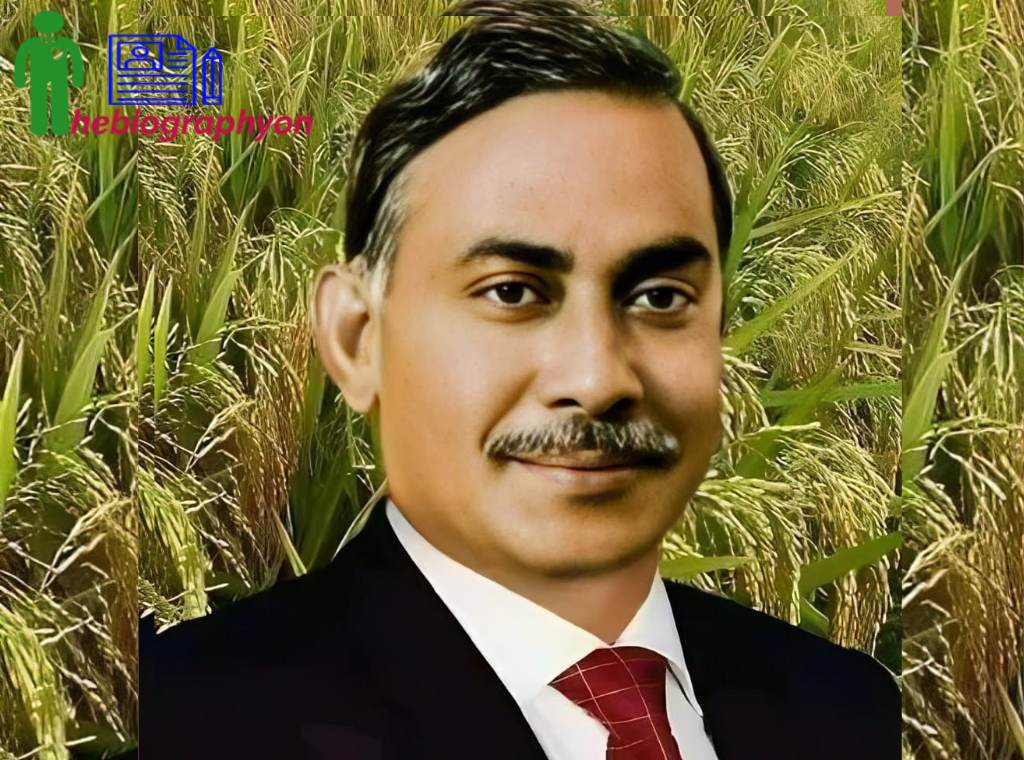“Ziaur Rahman: Bangladesh’s President, Military Leader, and BNP Founder – A Legacy Cut Short by Assassination in 1981.”
Born : 19 January 1936
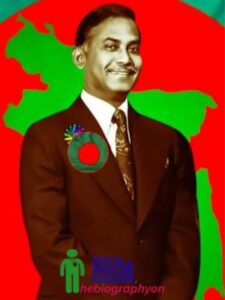
Place : Bagmara, Bengal, British India
(now Rajshahi, Bangladesh)
Died : 30 May 1981 (aged 45)
Chittagong, Bangladesh
Manner of death :
Assassination
Resting place :
Mausoleum of Ziaur Rahman,
Dhaka, Bangladesh
Nationality :
Bangladesh (from 1971)
Pakistan (1947–1971)
British subject (1936–1947)
Political party :
Bangladesh Nationalist Party
Spouse :
Khaleda Zia (m. 1960)
Children :
Tarique Zia
Arafat Zia
Relatives :
Majumder–Zia family
Alma mater :
D. J. Science College
Pakistan Military Academy
Command and Staff College
Awards :
Bir Uttom
Independence Award
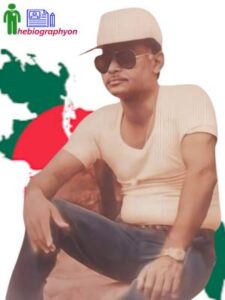
Hilal-i-Jur’at
Maroon Parachute Wing
Order of the Nile
Order of the Yugoslav Star
Military service
Allegiance :
Pakistan (before 1971) ,Bangladesh
Branch/service :
Pakistan Army
Bangladesh Army
Years of service :1955-1978
Rank :Lieutenant general
Service number: BA-69
Unit East Bengal Regimen
About :
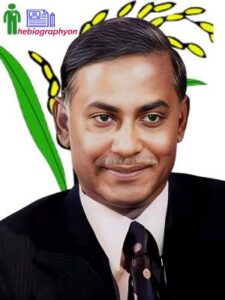
Ziaur Rahman, born on January 19, 1936, and assassinated on May 30, 1981, was a significant figure in Bangladeshi history, serving as the President of Bangladesh from 1977 until his tragic death. A military officer and politician, he played a crucial role in the country’s fight for independence and went on to establish the Bangladesh Nationalist Party (BNP), leading as its chairman until his assassination. His military career included being the second chief of army staff from 1975 to 1978.
Originally from Gabtali, Ziaur received military training at the Pakistan Military Academy in Abbottabad. He distinguished himself as a commander in the Pakistan Army during the Second Kashmir War, earning the Hilal-e-Jurrat from the Pakistani government. In the 1971 Independence War, Ziaur was a key commander in the Bangladesh Forces and played a pivotal role in announcing the country’s declaration of independence.
After the war, Ziaur held various high-ranking positions in the Bangladesh Army. His path to presidency involved complex events, including the assassination of Sheikh Mujibur Rahman and subsequent political upheavals. Ziaur assumed the presidency in 1977 under martial law.
As president, he introduced significant reforms, founding the Bangladesh Nationalist Party in 1978. Ziaur reinstated multi-party politics, freedom of the press, and free markets. His administration focused on agricultural development, social programs, and regional cooperation, leading to the establishment of SAARC in 1985. Internationally, he shifted Bangladesh’s alliances, improving relations with the West and China while moving away from the close alignment with India.
Despite his accomplishments, Ziaur faced numerous coup attempts, resulting in military tribunals and the execution of officers. His presidency earned him a reputation for being strict and ruthless among international observers. Ziaur retired from the Bangladesh Army in 1978 with the rank of Lieutenant General.
Ziaur Rahman’s legacy in Bangladeshi politics is a subject of debate. Awami League supporters criticize him for alleged connections to Mujib’s assassination, while critics argue that negative portrayals are politically motivated. However, he is generally credited for his role in the Liberation War, stabilizing Bangladesh, and fostering regional cooperation. The BNP, the political party he founded, remains influential, with his wife, Khaleda Zia, leading and serving two terms as prime minister.
Early Life :
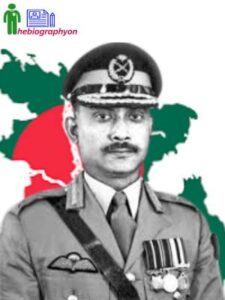
Ziaur Rahman, born on January 19, 1936, grew up in Bagbari village, Gabtali, Bogra District. His father, Mansur Rahman, a chemist specializing in paper and ink chemistry, worked in Kolkata. Ziaur’s grandfather, Moulvi Kamaluddin Mandal, migrated to Nashipur-Bagbari. His mother was Jahanara Khatun, and he had two younger brothers.
In 1946, Mansur enrolled Ziaur in Hare School, Calcutta, until the British Empire’s dissolution in 1947. Opting for Muslim-majority Pakistan, Mansur moved to Karachi, where Zia, at 11, attended Academy School. By 16, he completed secondary education in 1952. Zia entered D. J. Sindh Government Science College in 1953 and joined the Pakistan Military Academy at Kakul as a cadet the same year.
Conjugal Life :
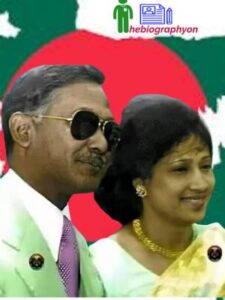
Ziaur Rahman was married to Khaleda Zia in 19601. They had two sons together, Tarique Rahman and Arafat Rahman (breath his last in 2015).. Khaleda Zia wasa prominent political figure in Bangladesh and served as the Prime Minister of Bangladesh thrice. Ziaur Rahman’s conjugal life was marked by his wife’s active involvement in politics and her leadership of the Bangladesh Nationalist Party (BNP), which he founded.Khaleda Zia’s political career was intertwined with her husband’s, and she played a significant role in shaping his political legacy1. Ziaur Rahman’s assassination in 1981 left a void in the political landscape of Bangladesh, and his wife Khaleda Zia took over the reins of the BNP.
Military service in Pakistan :
Ziaur Rahman graduated 12th in the PMA long course in 1955, joining the Pakistan Army as a second lieutenant. Excelling in commando and paratrooper training, he also completed a special intelligence course. He served in the Pakistan Army from 1955 to 1971 and then in the Bangladesh Army from 1971 to 1978.
During a visit to East Pakistan, Ziaur Rahman noticed a negative sentiment towards the military among the Bengali middle-class. Despite discrimination, he advocated for military careers for Bengali youth. After spending two years in Karachi, he transferred to the East Bengal
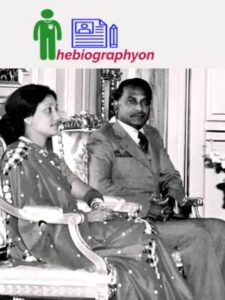
Regiment in 1957. He attended British Army military training schools and worked in military intelligence from 1959 to 1964.
Ayub Khan’s military rule convinced Ziaur Rahman of the need for a change in Bengali attitudes towards the military. In the Indo-Pakistani War of 1965, he commanded a company in the Khemkaran sector, earning the Hilal-i-Jur’at for gallantry. Ziaur Rahman served as a military instructor at the Pakistan Military Academy and attended the Command and Staff College in Quetta, completing a course in command and tactical warfare.
Throughout his military career, Ziaur Rahman played a key role in raising two Bengali battalions and received advanced training in West Germany from the British Army of the Rhine. In 1969, he joined the 2nd East Bengal Regiment as second-in-command, contributing significantly to the military’s growth. Meanwhile, his wife, Khaleda Zia, gave birth to their first child, Tarique Rahman, in 1966.
Pre-Independence :
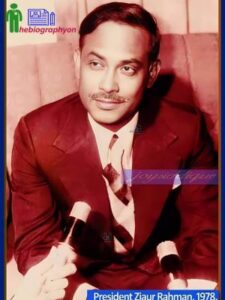
Ziaur Rahman returned to Pakistan in the following year. In October 1970, he was posted in Chittagong, East Pakistan, as the second-in-command of the 8th East Bengal Regiment. The region had been severely affected by the 1970 Bhola cyclone, leading to public resentment due to the slow response from the central government and political conflicts between Pakistan’s major parties, Sheikh Mujibur Rahman’s Awami League, and Zulfikar Ali Bhutto’s Pakistan People’s Party (PPP).
During the 1970 Pakistani general election, the Awami League won a majority, and its leader Sheikh Mujib aimed to form a government. However, President Yahya Khan, pressured by Zulfikar Ali Bhutto’s PPP party, delayed the convening of the legislature.
Bangladesh Liberation War :
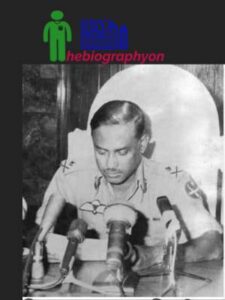
After failed talks, martial law was imposed by Yahya Khan, resulting in Sheikh Mujibur Rahman’s arrest on March 26, 1971. Ziaur Rahman, initially a Bangladesh Forces Commander in Sector 1 and later promoted to BDF commander of Sector 11 and Brigade Commander of Z Force from mid-July, played a pivotal role in the struggle for independence.
In response, Zia revolted against the Pakistani government, arresting and executing his commanding officer Lt. Col. Janjua. Local Awami League supporters urged him to announce the Declaration of Independence, initially proclaimed by Sheikh Mujibur Rahman on March 26. Ziaur Rahman’s first proclamation as the “Provincial Head” faced criticism, prompting a correction later on the same day.
Reflecting on his March 27 announcement in an interview with German Radio, Ziaur Rahman organized an infantry unit in Chittagong, creating Sector No. 1 with its HQ in Sabroom. Later transferred to Teldhala, Zia established Sector 11. All sectors were officially restructured under Bangladesh Forces in the Chittagong and Hill Tracts area, under Colonel M. A. G. Osmani, the Supreme Commander of Bangladesh Forces, of the Provisional Government of Bangladesh. On July 30, 1971, Ziaur Rahman became the commander of “Z Force,” a conventional brigade consisting of the 1st, 3rd, and 8th East Bengali regiments. With Z Force, he earned a reputation for bravery, receiving the Bir Uttom from the Government of Bangladesh.
Assassination of Mujib in 1975 and its Aftermath :
A conspiracy to remove Sheikh Mujibur Rahman was underway before his assassination. On August 15, 1975, he and his family were killed in a gunfight with army personnel. Khondaker Mostaq Ahmad, a conspirator, assumed the presidency, dismissing Major General K M Shafiullah. Ziaur Rahman, then deputy chief of army staff, became army chief after Shafiullah’s resignation.
The coup resulted in instability. Brigadier Khaled Mosharraf and the 46th Brigade revolted on November 3, 1975. Ziaur Rahman, under house arrest, relinquished his post. On November 7, the Soldiers and People’s Coup, led by the Jatiyo Samajtantrik Dal (JSD) and retired Lieutenant Colonel Abu Taher, unfolded. Khaled Mosharraf was killed, Shafaat Jamil escaped, and Ziaur Rahman was freed, reinstated as army chief.
An interim government was formed with Justice Abu Sadat Mohammad Sayem as chief martial law administrator and Ziaur Rahman as deputy. Discipline in the army collapsed, and efforts to disarm soldiers supported by JSD faced challenges. Another coup was plotted against Ziaur Rahman. He cracked down on the JSD and Gonobahini, sentencing Abu Taher to death in July 1976. Ziaur Rahman, now chief martial law administrator, worked to integrate the armed forces, addressing discontent through diplomatic missions for senior officers.
Presidency :
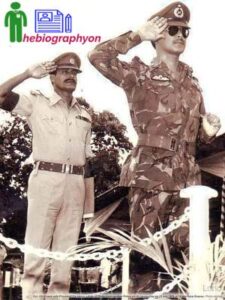
Ziaur Rahman took office in 1977, inheriting a nation in disarray. He lifted Marshall law and implemented extensive reforms for Bangladesh’s development.
In September 1977, a failed coup unfolded. Japanese Red Army terrorists hijacked Japan Airlines Flight 472, diverting it to Tejgaon International Airport. Simultaneously, revolts erupted in Bogra and Dhaka cantonments. While the Bogra revolt was swiftly quelled, Dhaka witnessed an uprising by misinformed airmen of the Bangladesh Air Force. Although unsuccessful in attacking Zia’s residence, they briefly captured Dhaka Radio and caused casualties at Tejgaon International Airport.
Wing Commander M. Hamidullah Khan, BAF Ground Defence Commander, suppressed the air force rebellion. Ziaur Rahman appointed him ZMLA (Dhaka) and Director of Martial Law Communications and Control. Government intelligence failure led to the dismissal of DG-NSI and DFI chief AVM Aminul Islam Khan. Zia directed the transfer of DFI to Dhaka Cantonment, reorganizing it as DGFI. Over 200 soldiers involved in the coup faced execution after a military trial.
Zia doubled the size of the police force and increased the army’s strength from 50,000 to 90,000. In 1978, he appointed Hussain Muhammad Ershad as Chief of Army Staff, recognizing him as a professional soldier with no political aspirations, fostering a close political and military relationship.
Election :
Elections in 1978 saw General Ziaur Rahman securing a significant five-year presidential term. The subsequent National Assembly elections in 1979 faced allegations of integrity issues, stirring controversy and prompting critics to question the legitimacy of the electoral process under Ziaur Rahman’s leadership. Despite challenges, he allowed Sheikh Hasina, the exiled daughter of Sheikh Mujibur ahman, to return to Bangladesh in 1981. Zia’s political decisions and governance sparked debates on democratic processes. The return of Sheikh Hasina, a prominent political figure, added a significant dimension to the evolving political landscape in Bangladesh, shaping the nation’s political trajectory.
Domestic and foreign policies :
Upon assuming power, Ziaur Rahman was hailed as the strict leader that the struggling nation of Bangladesh needed. At the time, the country grappled with significant challenges, including high illiteracy, severe poverty, chronic unemployment, and economic stagnation. Ziaur Rahman departed from the secular, democratic socialist, and pro-Indian policies of his predecessor, Sheikh Mujibur Rahman.
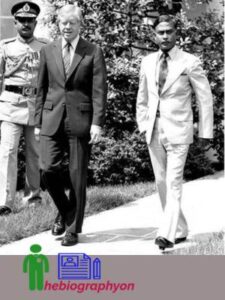
Ziaur Rahman announced a comprehensive “19-point program” aimed at economic emancipation. The program underscored key principles such as self-reliance, rural development, decentralization, free markets, and population control. Throughout his presidency, Ziaur Rahman dedicated much of his time to traveling across the country, preaching what he termed the “politics of hope.” His message urged Bangladeshis to work harder and produce more, embodying a vision for the nation’s progress.
Cabinet meetings were held extensively throughout Bangladesh, demonstrating Ziaur Rahman’s commitment to engaging with various regions. His focus on boosting agricultural and industrial production, especially in food and grains, was accompanied by initiatives like the establishment of Bangladesh Jute and Rice research institutes. Additionally, a notable and popular food-for-work program was launched in 1977.
Ziaur Rahman advocated for private sector development, facilitated export growth, and reversed the collectivization of farms. His overnment took steps to reduce quotas and restrictions on agriculture and industrial activities, fostering a more dynamic economic environment. Major infrastructure projects, including the construction of irrigation canals, power stations, dams, and roads, were initiated under his leadership.
The president also directed efforts towards rural development by establishing Gram Sarkar for self-government and the “Village Defence Party” for enhanced security and crime prevention in rural areas. Mass-scale programs for primary and adult education, particularly targeted at rural Bangladesh, were initiated, contributing to broader economic advancement.
During Ziaur Rahman’s presidency, Bangladesh experienced rapid economic and industrial growth. He also made significant strides in reorienting the nation’s foreign policy, addressing concerns from both rightists and renegade leftists. Departing from prior alignments with India and the Soviet bloc, Ziaur Rahman sought closer relations with the United States, Western Europe, Africa, and the Middle East. Notably, he worked towards normalizing relations with Pakistan and improving ties with other Islamic nations.
Furthermore, Ziaur Rahman proposed the formation of an organization comprising South Asian nations to enhance economic and political cooperation at a regional level. This proposal materialized in 1985 under the presidency of Hussain Muhammad Ershad, resulting in the establishment of the South Asian Association for Regional Cooperation (SAARC) in Dhaka. Ziaur Rahman’s visionary approach to regional cooperation earned him a posthumous award from SAARC, highlighting his lasting impact on the geopolitical landscape.
Ziaur Rahman strategically shifted Bangladesh’s foreign policy, addressing concerns from both staunch rightists and renegade leftists about the nation’s reliance on Indian support. Departing from close ties with India and the Soviet bloc, he fostered stronger relations with the United States, Western Europe, Africa, and the Middle East.[46] He also worked to normalize connections with Saudi Arabia and the People’s Republic of China, previously opposed to Bangladesh’s creation. While distancing from India, Ziaur Rahman aimed to strengthen bonds with other Islamic nations, enhancing Bangladesh’s standing in the Middle East.[29] His visionary proposal for regional cooperation in South Asia materialized in 1985 with the formation of the South Asia Association for Regional Cooperation, earning him a posthumous award for foresight.
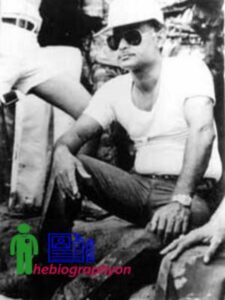
Sabuj Biplob :
Sabuj Biplob, or the Green Revolution, was a term coined by President Ziaur Rahman to describe his agricultural policy that aimed to increase food production and self-reliance in Bangladesh. He launched the Sabuj Biplob in 1977, soon after he became the president, and implemented various measures such as providing subsidies for fertilizers, seeds, irrigation, and electricity, promoting the use of high-yielding varieties of crops, expanding the area under cultivation, and encouraging the participation of farmers’ cooperatives. As a result of his policy, Bangladesh achieved a remarkable growth in agricultural output, especially in rice, wheat, and jute, and reduced its dependence on food imports
Sabuj Biplob was not only an economic strategy, but also a political slogan that reflected Ziaur Rahman’s vision of a prosperous and self-reliant Bangladesh. He used the term to mobilize public support for his regime, which faced opposition from various political parties and factions. He also projected himself as a leader who cared for the welfare of the rural masses, who constituted the majority of the population. Sabuj Biplob was one of the main themes of his election campaign in 1978, when he won a landslide victory and established his legitimacy as the president
Sabuj Biplob was a significant achievement of Ziaur Rahman’s presidency, and it had a lasting impact on the development of Bangladesh. It helped to improve the food security, nutrition, and income of the people, and contributed to the economic growth and stability of the country. It also enhanced the image and prestige of Ziaur Rahman, both at home and abroad, as a successful and popular leader.
Canal Digging :

Canal digging was one of the rural development programs initiated by President Ziaur Rahman to increase agricultural output and irrigation in Bangladesh. He started the program in November 1977 and personally supervised and participated in the canal digging activities in different parts of the country
The program aimed to improve the drainage system, reclaim land from waterlogging, and provide water for crops. It also involved the participation of local farmers and villagers, who were encouraged to form cooperatives and share the benefits of the canals. The program was successful in enhancing the productivity and profitability of agriculture, especially in rice, wheat, and jute
Canal digging was not only an economic strategy, but also a political slogan that reflected Ziaur Rahman’s vision of a prosperous and self-reliant Bangladesh. He used the term “Sabuj Biplob” or “Green Revolution” to describe his agricultural policy, which also included subsidies for fertilizers, seeds, irrigation, and electricity, and promotion of high-yielding varieties of crops. He mobilized public support for his regime by showing his concern for the welfare of the rural masses, who constituted the majority of the population
Islam and Nationalism
Ziaur Rahman noticed a tremendous identity crisis in Bangladesh, each religious and country wide. To tackle this, he kicked off a process of re-Islamization. Think about it as a chunk of a constitutional makeover. He introduced Islamic elements just like the salutation “Bismillahir-Rahmaanir-Rahim” and swapped out socialist commitments for a new focus on “financial and social justice.” Ziaur Rahman additionally made Islamic training compulsory for Muslim college kids.

But this pass didn’t take a seat nicely with every person. Critics said he become straying from Sheikh Mujib’s secular route, whilst others argued that records had its say in this matter. Ziaur Rahman went on to lift bans on Islamists and communal parties, making things a chunk extra various on the political front.
In his public talks, Ziaur Rahman championed “Bangladesh Nationalism” and a national identity with Islam at its middle. He reached out to non-Bengali minorities, amending the constitution to emphasize this countrywide identity. However here’s the seize – this Bangladeshi nationalism disregarded non-Muslim minorities, specifically the Hindu community.
After founding the Bangladesh Nationalist birthday celebration, Ziaur Rahman went all in. He installation political institutes and workshops, ensuring the adolescents were given a great dose of Bangladesh nationalism. In this type of workshops, returned in September 1980, Ziaur Rahman shared his insights with the eager inexperienced persons.
Assassination
Ziaur Rahman, at some point of his tenure, confronted criticism for perceived harshness towards military competition. Despite widespread reputation, his rehabilitation of controversial figures drew vehement competition from Awami League supporters and Mukti Bahini veterans. Amidst apprehensions of unrest, Ziaur Rahman visited Chittagong on might also 29, 1981, to deal with an intra-birthday celebration dispute in the regional BNP. The entourage lodged at the Chittagong Circuit residence.
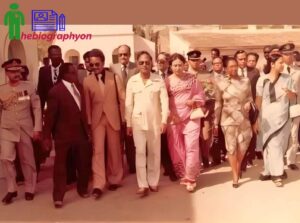
In the early hours of may 30, 1981, Ziaur Rahman turned into assassinated by means of a collection of military officials. The assailants additionally claimed the lives of six bodyguards and aides. The funeral, expected to be attended with the aid of nearly million people, transpired at Parliament rectangular.
Criticism and legacy
Ziaur Rahman is hailed as a war hero by Bangladeshi politicians. Credited with ending sickness in Sheikh Mujib’s very last years, he established democracy by means of abolishing BAKSHAL (Mujib’s one-birthday celebration rule). Despite complaint for suppressing competition, Zia’s financial reforms are identified for rebuilding the economy. His shift towards Islamization garnered help from regular Bangladeshis.
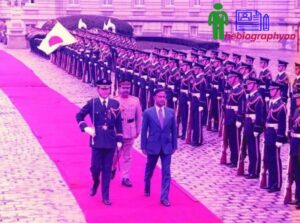
Ascension to Presidency
The Dhaka excessive courtroom deemed the army coups, including Zia’s regime, from 1975 to 1979 as “unlawful and unconstitutional.” It declared Zia’s martial regulation decrees, his upward push to the presidency in 1977, and the 1978 election as “unknown to the constitution.” This ruling contradicted the Indemnity Act, which had given legal fame to these activities and included them into the constitution.
Communal Conflict
Deviating from Sheikh Mujib’s secularism, Zia brought Islamic politics in Bangladesh and joined the employer of Muslim international locations, earning giant public appreciation. However, historians argue that these moves alienated and antagonized Bangladesh’s tribal and religious minorities, main to destiny sectarian and tribal conflicts.
Suppression of Opposition
In Ziaur Rahman’s era, political fighters confronted severe suppression. Allegations recommend the arrest of around sixty two thousand Awami League and different opposition figures, drawing international interest. About 3,000 soldiers, military officers, and civilians were said to have disappeared or been killed for the duration of Zia’s regime. In a top notch incident, around 1,143 human beings have been executed in numerous Bangladeshi prisons for his or her alleged involvement in a failed coup strive on October 2, 1977.
Honours
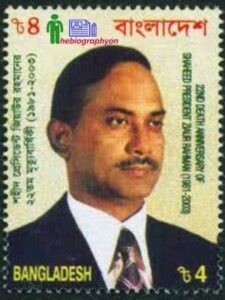
After his loss of life, Turkey honored Ziaur Rahman through naming a avenue in Ankara as Ziaur Rahman Caddesi.In BBC’s 2004 poll, Ziaur Rahman turned into ranked nineteenth a number of the greatest Bengalis of all time.[76] The South Asian association for local Cooperation recognized him for statesmanship and vision. Different honors consist of:
- Pakistan: Hilal-i-Jur’at
- Egypt: Order of the Nile
- Yugoslavia: Order of the Yugoslav Great Star
- North Korea: Hero of the Republic
Read More “Khaleda Zia“
Read More “Bangabandhu“
Read More “Sheikh Hasina”
Read More “Nelson Mandela”
Reference : www.biographiess.com







